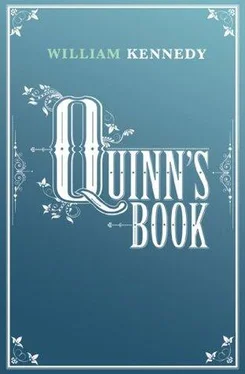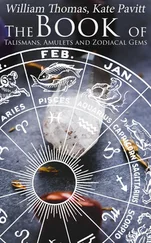I must convey now that the fated stroke that aligned Alfie Palmer against the Ryans was an event of historical moment in Albany, for it defined boundaries, escalated hatreds, and set laboring men of near-equal dimension and common goal against each other. In years to come, periodic battles would be waged anew as a consequence of what was about to happen this day. These battles, which invariably took place on Sundays, when men were off work and free to maim one another, raged for hours without interference from the constabulary. The battles (the first was called the Ryans against the Palmers) were in time called the Hills against the Creeks, the Hills being the neighborhood to which Alfie Palmer, and others like him, had risen: high ground that represented a social ascendancy from where the Creeks lived — the low-lying slums, the mean and fetid nest of hovels on the shores of the Foxenkill, that foul creek where the shacks of the Irish erupted overnight like anarchic mushrooms and where the killing of Toddy Ryan took place.
Will Canaday returned after breakfast, and he, Lyman, and Dirck made ready to leave the mansion. I followed behind, and Joey Ryan behind me.
“No, no,” Will said to us. “You stay here. Down there is no place for children. Take care of the boy here,” and he pointed to Joey.
“It would be good for my education to see such a thing,” I said.
“I want you alive to get an education,” said Will as he and the others climbed into the carriage. Hillegond stood in the doorway as the carriage pulled away, and then called Joey and me inside.
“Come in where it’s safe,” she called.
“No,” said Joey, and he broke into a run, following in the wake of the carriage.
“I’ll get him,” I said, and then I, too, was running, with Hillegond’s screams fading behind me.
I COULDN’T CATCH JOEY. He was fleet as a wild animal, and more fit than I for such a run, which was two miles or more across open fields, down the gully, and over the footbridge that spanned the Patroon creek, then up the hill on the far side, where I lost sight of him amid distant houses. It was my assumption he would head for Canal Street, where he lived, and it was toward that notorious thoroughfare that I headed.
Bells welcomed me to the populated city, and I saw women and children walking — toward church, I presumed. People were also moving into a vacant field that began the long slope eastward toward the canal and the river. At the crest of the field I saw forty or more men below me, standing, talking, many with clubs in hand. I sensed what they were about and that they would not be likely to give allegiance to Toddy Ryan.
I kept walking south and approached Canal Street, with its creek coursing beside it. This was the neighborhood called Gander Bay, named after the sassy fowl the Irish kept in the Foxenkill. It was a place of dread and danger, of woe and truculence. Its dirt pathways, which became deep and pervasive mud when it rained, were narrow, crooked, and violable by the sudden erection of hovels that would force a detour. Many of these hovels looked as if they’d been thrown together in a day, an upthrust of uneven boards with no windows, buttressed by sod or raw earth. Looming up among them was the occasional giant of an ordinary house, half a century old, built when this was open space and the crowd had not yet arrived.
I’d been in the area before, but not often. It gave no welcome to strangers. In one of the big houses near the creek lived two old brothers, Dinny Reilly, who collected grease from neighbors to make soap (for a certain amount of grease he’d give you a bar of soap), and Johnny Reilly, called Johnny the Cats, who went to jail at cholera time for throwing dead cats into the Foxenkill. Johnny won his name by living with four dozen cats, and the neighborhood rhyme about the men was known to many:
Pitty-pat, sugar and fat ,
Old Dinny Reilly
And Johnny the Cats.
Children were running free, and women were doing their washing in the creek, clothes already drying on tree limbs in Gander Bay’s early sunlight. A man sat astride a backless chair in the doorway of one shanty, arms folded, pipe in teeth, back stiff and straight: prepared for events. Around him lay half a dozen cats and I took him to be Johnny of the rhyme.
“Good morning, sir,” I said.
“It’s a good morning if ye think it is,” he said.
“Do you know where the Ryans live?”
“There’s Ryans the world over.”
“A boy. Joey Ryan. His father was Toddy.”
“Aaah, those Ryans. Ye’d best stay away from that house.”
“I know Joey. I want to help him.”
“Then folly your nose that way and ye won’t miss it.”
My nose led me along a dirt lane, soft from the previous day’s moderate rains, to a turning where I saw a crowd of people, and above them the head and shoulders of a young man in sweater and cap, standing in a wagon, haranguing the crowd in vibrant oratory: “This is what comes of bein’ an Irish workin’man,” and he turned his gaze downward, then up again to the crowd. “A good man. . alive with the family last night. . then murdered in front of his children. . Toddy Ryan gone today. . who’ll go tomorrow?”
The silent crowd was with the man, nodding its reverence. Children on the edge moved away when his pause broke their attention. A gray-haired woman in a threadbare shawl pushed forward, her hair tight in a bun, her jaw jutting out with anger.
“I knew Toddy Ryan,” she said. “He was a good man and he deserves better than you’re givin’ him. Look at him there, shameful.” (We all looked toward the wagon, but I could see nothing because of intervening bodies.) “Bring the man indoors and wake him properly. It’s sacrilegious, this is.”
“Ah, close your mutt, woman,” said the man in the wagon. “They’ll be after you next, and then after your children.”
“Where’s this fight you’re talkin’ about?” a man in the crowd asked.
“We start at the foot of Lumber Street,” came the answer. “There’ll be clubs there for all. We’ll move in a body and meet the divvil himself if he’s a mind to fight us.”
Satisfied with the answer, the questioner nodded and moved away. Others followed him, leaving an opening that let me see the wagon. Toddy Ryan lay on three boards nailed together, tied down with a rope around his waist so he wouldn’t slide off, the boards slanted to allow us full view of his final image: hands folded on his chest, toes of his shoes too long and turned up, ill-fitting clothes full of stains and holes — a runt of a man who, in addition to being horridly dead, had died in terrible health. His cranial cleft and the caked blood of his wound were the unforgettable focus of the cautionary tableau he offered us: here lies a dead Irishman.
The speaker resumed his harangue and some in the crowd fell away. But newcomers kept arriving in a steady stream, and I learned that Toddy, since daybreak, had been on tour of all Irish neighborhoods in the city’s north and west ends, a traveling theater piece: drama in the flesh. I asked a woman beside me where the dead man had lived.
“Over there, isn’t it?” she said, pointing to a board shanty. I went to it and saw the door and wooden latch Alfie Palmer had kicked in. I called Joey’s name but got no answer, then saw the interior was dark and barren, lit only by the light from the open door, and on the floor a broken clay pot and rusty tin cup. Whatever else of life’s things the Ryans once owned had been removed by scavengers. Sunlight shone across the large bloodstain on the dirt floor where Toddy Ryan bled his profuse last.
I considered what I should do in this place, then stepped fully inside, closed the door, and shut out the day. The room became blackness of a deep order. I breathed the smell of earth and tried to imagine the life of the Ryans in this tiny room, then tried to imagine them living in a ditch with their wagon as a roof. Poor as we Quinns had been (and we had gone weeks without money, our food all charity from relatives), never were we dirt poor, nor ever before had I understood the meaning of that phrase: to live day and night inhaling the odor of raw earth. I felt like a burrowing animal, and thought how the Ryans must have cursed all things and people that had brought them to this condition, and how they must have envied all who lived above it.
Читать дальше












